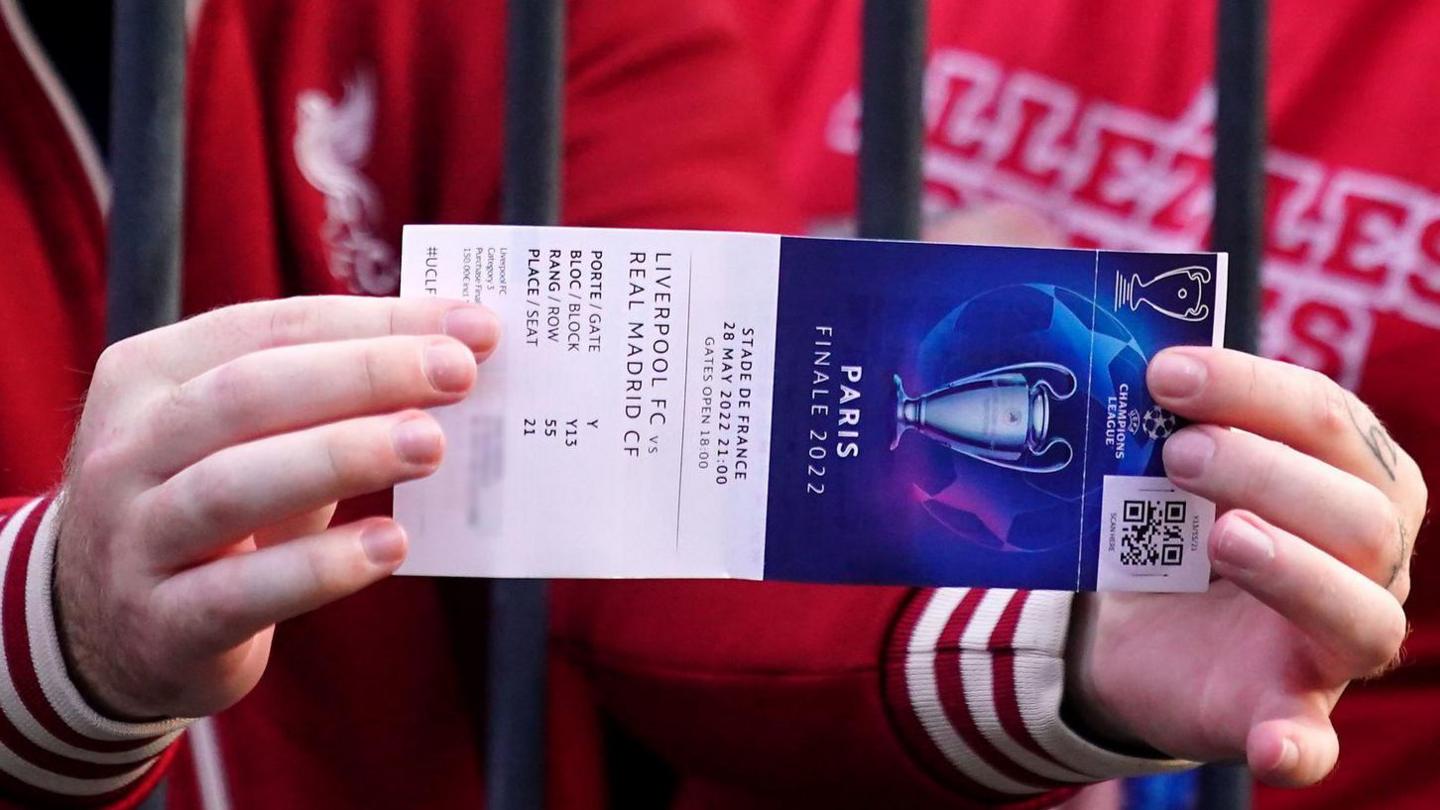£1,500 fake football tickets 'hard pill to swallow'

- Published
When lifelong Liverpool fan Matty Orme opened the email attachment that was supposed to be the Champions League final tickets he had paid £1,500 for, he knew he had been scammed.
He had missed out on tickets in the official club ballot and had turned to a social media page that said it was selling tickets for the 2022 final in Paris.
He says he had used the site before and so "didn't think twice" before paying "a lot of money" for something that was "special" for him as a football fan.
That was until he looked at what arrived in his inbox.
"I opened the PDF on photoshop and saw the layers had been edited and knew straight away that it was a fake," he told the BBC as part of its Scam Safe week.
"I messaged the Twitter account but they never got back in touch. In fact, they deleted their account and their mobile number went dead too.
"It was a hard pill to swallow."
According to data released by Santander on Thursday, nearly a quarter of a million pounds (£243,000) was reported lost to sports ticket scams by its customers between January and September this year.
The bank said football-related scams made up the largest share, accounting for more than half (52%) of all losses.
While football-related scams were the most common, other sports had bigger losses per victim. Motorsports ticket scams had the highest average loss at £3,851, with total losses reaching £50,070. Golf came next, with fans losing an average of £860 and a total of £51,685.
The average loss per sports ticket scam has risen to £352 this year from £225 in 2023, according to the bank, and there were 693 claims made in the period.
Orme posted about his experiences on social media "as a warning" to others and received messages from others with similar experiences.
"It was one of those guys who made a WhatsApp group to bring us all together and that's when we realised the scale - there were about 50-60 others like us and all together we think we've lost upwards of £100k."
Orme, whose team lost to Real Madrid in the final, did in fact get his money back eventually through his bank.
"I got lucky because I'd been able to prove I'd bought through the same Twitter page before and it was a legitimate sale that first time," he said. "This shows I hadn't just sent someone money without checking when I did actually get scammed - so I won my case through the ombudsman. Loads of the people still haven't got their money back though."
Detective sergeant Danny Galvin of Merseyside Police told the BBC's Morning Live last month that police see spikes in "this sort of ticket scam behaviour" when there are high-profile fixtures with a scarcity of tickets.
"Unfortunately, when you choose to not buy through a legitimate seller you do lose all sorts of protection and leave yourself vulnerable to scammers," he added.
A Lloyds Bank study earlier this year showed criminals were most likely to target fans of the biggest teams, with supporters of Arsenal and Liverpool falling victim most often.
And according to the NatWest League of Ticket scams – which is a table based on the volumes and value of cases reported to the bank – Liverpool fans were the most scammed,, external losing more than £17,000 to criminals in the 2023-24 season.
The Lloyds Bank study estimated that around 6,000 UK football fans fell victim to fraud in the 2023-24 season for non-existent Premier League tickets, which was an increase of around a third compared with the previous season.
What protection do fans have?
When criminals dupe their victims into sending them money by pretending to be a legitimate company, such as their bank or a tradesperson, or by selling goods that do not exist, this is known as APP (authorised push payment) fraud.
New mandatory rules took effect on 7 October which mean UK banks will refund APP fraud victims up to £85,000 within five days.
Before these rules came in, most banks had signed up to a voluntary reimbursement code.
There were 97,344 cases of APP fraud in the first half of 2024, with total losses of £214m.
"Given the recently introduced new APP fraud rules, it's interesting to know if Matt's friends would have been able to get their money back via their banks, I'd assume so," TV presenter and consumer champion Matt Allwright said.
"As always I'd say make sure to use a credit card for purchases above £100 because then you're much better protected if something goes wrong."
You get extra protection if you use a credit card to make a purchase between £100 and £30,000 under section 75 of the Consumer Credit Act 1974.
Football fans are widely advised to buy directly from clubs or authorised ticket partners.
If you have been affected by fraud, support can be accessed through the BBC's Action Line.